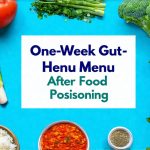Recovering from a food-related illness – whether it’s a mild case of food poisoning, a more severe bacterial infection, or even a reaction to a food allergy – can be incredibly debilitating. Your digestive system has been through a significant ordeal, and giving it the right support is crucial for a swift and comfortable recovery. Often, focusing on what not to eat during this period is just as important as concentrating on foods that are gentle and restorative. Ignoring dietary restrictions when your gut is vulnerable can prolong symptoms, exacerbate inflammation, and even lead to long-term digestive issues. This isn’t about deprivation; it’s about strategically choosing foods that won’t further irritate a sensitive system, allowing it to heal effectively.
The specific dietary needs will vary based on the nature of the illness – a viral gastroenteritis will require different considerations than, say, E. coli infection or an allergic reaction. However, there are common principles applicable across most food-related illnesses. The goal is always to minimize stress on the digestive tract and allow it to rest. This means avoiding foods that are difficult to digest, highly stimulating, or potentially irritating. It’s also vital to stay adequately hydrated – often easier said than done when dealing with nausea and vomiting – but crucial for replenishing fluids lost during illness and aiding in recovery. Understanding these principles and applying them thoughtfully can significantly improve your healing process. If you’re unsure about specific dietary needs after an illness, it may be helpful to understand what happens when you eat foods you’re sensitive to.
Navigating the Initial Stages of Recovery: What to Avoid
The first 24-72 hours after experiencing a food-related illness are generally the most critical. During this phase, your digestive system is at its weakest, and even seemingly innocuous foods can trigger symptoms. The focus should be on allowing the gut to calm down and begin repairing itself. This means drastically simplifying your diet and eliminating anything that could potentially cause further distress. – Avoid solid foods initially, opting for clear liquids like water, electrolyte solutions (Pedialyte or similar), and weak herbal teas (ginger or chamomile can be soothing). – Gradually reintroduce foods based on tolerance, starting with the BRAT diet – bananas, rice, applesauce, and toast – which are easy to digest. – Pay close attention to your body’s signals; if a food causes discomfort, stop eating it immediately.
Highly processed foods should be strictly avoided during this initial phase. These often contain artificial additives, excessive sugar, and unhealthy fats that can further irritate the digestive system. Similarly, high-fat foods are difficult to digest and can worsen nausea or diarrhea. This includes fried foods, greasy snacks, rich sauces, and fatty meats. Dairy products can also be problematic for some individuals, especially if they experience temporary lactose intolerance following a gastrointestinal illness. Even seemingly harmless dairy like yogurt might exacerbate symptoms in the short term. The idea is to give your gut a complete break from anything that requires significant effort to process. If you are experiencing inflammation, consider what to eat when your gut is inflamed.
Finally, spicy foods are absolutely off-limits. Capsaicin, the compound responsible for the heat in chili peppers, can irritate the digestive tract and trigger heartburn or diarrhea. Avoid strong spices like curry powder, cayenne pepper, and even black pepper. The same goes for acidic foods such as citrus fruits, tomatoes, and vinegar-based dressings. These can exacerbate nausea and stomach upset. Remember that recovery isn’t a race; it’s about patiently allowing your body to heal, and the more gentle you are with your digestive system during this crucial period, the faster you’ll feel better.
Foods That Prolong or Worsen Symptoms
Certain food groups consistently contribute to prolonged discomfort during recovery from food-related illness. Understanding these can help you make informed choices and avoid unnecessary setbacks. Caffeine is a prime example – it stimulates bowel movements and can worsen diarrhea, while also potentially causing dehydration. This includes coffee, tea (beyond gentle herbal options), energy drinks, and even chocolate. Alcohol should be avoided for similar reasons; it irritates the stomach lining and interferes with hydration. Even moderate alcohol consumption can significantly delay recovery.
Another category of problematic foods is those high in fiber, particularly insoluble fiber. While fiber is generally beneficial for digestive health, during recovery, it can overwhelm a sensitive system. Foods like raw vegetables, whole grains (bran muffins, brown rice), and legumes (beans, lentils) should be avoided until your gut has fully recovered. These foods require significant chewing and digestion, placing undue stress on the intestines. Instead, opt for refined grains initially, gradually reintroducing fiber-rich options as tolerated. If meals feel heavy, you may want to test what to test when meals feel like they ‘sit heavy’.
Finally, sugary drinks and foods can also exacerbate symptoms. Excessive sugar intake can lead to osmotic diarrhea – where water is drawn into the intestines, worsening fluid loss – and may also contribute to bloating and gas. This includes soda, fruit juice (even natural varieties), candy, and pastries. Artificial sweeteners should also be avoided as they can have a similar effect on the digestive system. Focusing on bland, easily digestible foods with minimal sugar is key during the acute phase of recovery.
Reintroducing Foods: A Gradual Approach
The transition from a liquid or BRAT diet back to normal eating should be gradual and carefully monitored. Don’t attempt to jump back into your regular diet overnight; this is a recipe for relapse. Start by slowly introducing small portions of easily digestible foods, one at a time. If you tolerate a new food without experiencing any adverse symptoms, you can gradually increase the portion size and introduce another new food. This process may take several days or even weeks depending on the severity of your initial illness.
- Begin with cooked vegetables that are gentle on the stomach, such as carrots, potatoes (without skin), and green beans. – Lean protein sources like boiled chicken or fish can be introduced in small quantities. Avoid fried or heavily seasoned meats. – Continue to prioritize hydration; sip water throughout the day and consider adding electrolyte solutions if you’ve experienced significant fluid loss. – Listen to your body! If a food causes bloating, gas, diarrhea, or nausea, stop eating it immediately and revert back to a more restricted diet until symptoms subside.
It’s also important to be mindful of potential sensitivities that may develop after a food-related illness. Some individuals experience temporary lactose intolerance or gluten sensitivity following gastroenteritis. Be prepared to adjust your diet accordingly if you notice any signs of intolerance, such as bloating, gas, or diarrhea after consuming dairy products or gluten-containing foods. If these symptoms persist, it’s worth consulting with a healthcare professional to rule out underlying issues and develop a personalized dietary plan. You can also check when digestion slows down in the evening, as this may indicate an issue. Understanding your gut’s motility is key; you might even consider asking for a motility scan and what it shows if symptoms are persistent. And to get a deeper understanding of your gut health, a stool analysis can be incredibly insightful.


















